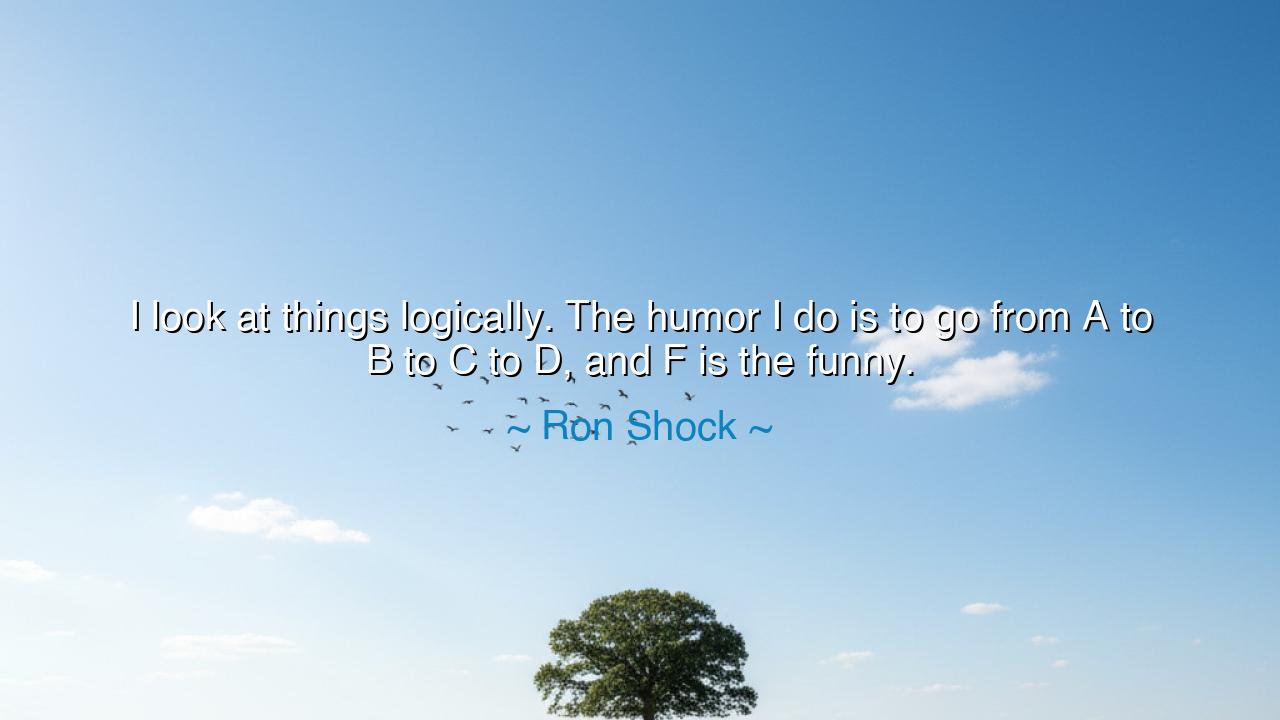
I look at things logically. The humor I do is to go from A to B
I look at things logically. The humor I do is to go from A to B to C to D, and F is the funny.






In the wisdom of the ancient world, where every word carried weight and every lesson echoed through the annals of time, there were those who mastered the art of logic. They understood that truth is not born in haste or whim, but in careful steps, measured and deliberate. The mind of the great teacher, the visionary, and the sage is not a random whirlwind of disconnected thoughts, but a river that flows with purpose. Thus, when Ron Shock declared, "I look at things logically. The humor I do is to go from A to B to C to D, and F is the funny," he offered a profound reflection on the nature of reason and humor—a reflection that transcends time and space, and which we must carry forward into our lives.
Let us first delve into the core of this truth: the relationship between logic and humor. In a world filled with chaos and disorder, it is the thoughtful mind that finds clarity and beauty. The great thinkers of our past, from the philosophers of Greece to the strategists of Rome, knew that every act of creation, be it in art, in war, or in speech, was birthed from a sequence of deliberate actions. A to B to C to D—these are not mere steps, but sacred paths upon which the mind travels. It is in the steady, predictable journey of thought that we find our ultimate destination. And yet, in the journey’s final stop—at F, where laughter resides—it is not the orderly path itself that is amusing, but the sudden revelation that the mind did not expect. Humor, then, arises not from randomness, but from the unexpected within the confines of order.
Consider the teachings of the great Socrates, whose wisdom did not come in the form of jokes or riddles, but in careful questioning. He sought to lead his students down paths of logical reasoning, only to surprise them at the end with a profound truth that seemed both inevitable and paradoxical. It is in the gap between the expected and the unexpected that the mind dances in joy, and thus, humor is born. Socrates did not laugh for the sake of amusement; he laughed because the journey of thought itself, when led with wisdom, reveals the absurdities of life—an absurdity that is, in fact, its own form of wisdom.
Ron Shock's words, then, invite us to consider this very principle in our own lives. How often do we walk through life without purpose, scattering ourselves in disarray, in the hopes of finding meaning or joy? We chase after distractions, yet true understanding and laughter lie in the discipline of thought. The greatest comedians in history, those who have touched the deepest parts of the human soul, did not stumble into humor by accident; they, like Shock, followed a path. A to B to C to D—these were not mere steps; they were choices, decisions, and reflections that led to the final moment of F, where joy and laughter flourish.
In the story of Archimedes, the great mathematician, we see this principle alive. He was not merely a seeker of answers in the realm of numbers; he was a seeker of truth, and it was through the careful work of his mind, moving logically from one step to the next, that he stumbled upon the Eureka moment in the bath. His laughter, that joyous exclamation, was not a random burst of emotion, but the result of a mind, at once, surprised and delighted by the consequences of its own reasoning. The lesson we learn from Archimedes is that laughter, in its purest form, is the recognition of order in what seemed chaotic.
Yet, let us not confuse logic with rigidity, or humor with mere surface-level amusement. The power of Shock’s insight lies in the recognition that we must engage with the world around us with full intention, even in our moments of joy. When we approach life with clarity, whether in the realm of work, relationships, or self-growth, we pave the way for moments of unexpected joy. It is the mind that is clear, the spirit that is disciplined, and the heart that is open, which leads us to moments of profound revelation and laughter.
Therefore, let us live according to this teaching. In every action, in every thought, take a moment to move through the steps with purpose. Know that life is not a chaotic storm, but a series of deliberate movements. Step through the path of logic, step through the path of reason, and when you arrive at the unexpected, when you see the surprise of life, laugh. It is there that you will find the richness of humor and wisdom intertwined. And through this laughter, you will find the deepest joy of all: the joy of understanding the order of things, and the wisdom of seeing the world clearly.
Let this be the legacy you carry forward: Walk the path of logic, of purpose, and of deliberate thought. And when you reach the end, when you arrive at that unexpected moment of humor, celebrate it. For in this, you shall find the harmony of life itself.






AAdministratorAdministrator
Welcome, honored guests. Please leave a comment, we will respond soon